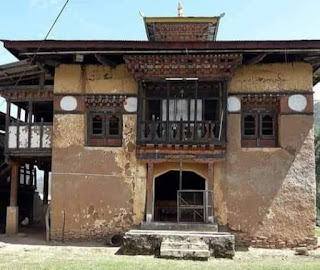TRADITION | MOUSTACHE ETIQUETTE
During the communal rules of Desi, Ponlop and Dzongpoen, moustache etiquette had been one important aspect of hierarchical driglam.
In those days, at the courts of Desi, Ponlop and Dzongpoen, the junior court attendants འབོད་སྒར་པ་ should be mindful of the manner of their moustaches in front of senior officers like Zimpoen (Chamberlain), Dronyer (Protocol Officer), Nyerchen and of course the Desi, Ponlop and Dzonpoen. Juniors should quickly roll down their moustaches the moment they see their senior officers or commanders pass by or whenever they were summoned.
Jau-yar-dreel རྒྱ་བ་ཡར་སྒྲིལ་ or moustache styles such as Handlebar, English, Dali or Imperial officially belonged to seniors while juniors were also allowed to maintain those styles provided they were mindful of the moustache etiquette moment they encounter the seniors. Keeping Walrus, Horseshoe, Chevron, Fu Manchu and Lampshade styles of moustaches could be safely maintained by all junior court attendants. That mannerism of lowering the two ends of moustaches is called Jau-ma-dreel རྒྱ་བ་མར་སྒྲིལ.
Lowering the two ends of the moustaches was similar to lowering one's back out of respect and obedience.
And keeping Bhutan's history, culture and tradition in context, who do you remember instantaneously when you think of iconic beards and moustaches? I'm sure most will fondly and respectfully remember Zhabdrung Ngawang Namgyal and the First Druk Gyalpo Gongsar Ugyen Wangchuck. Often colloquially yet out of deepest respect, monks in Zhung Dratshang still call Zhabdrung by Jau Rim (long beard). There was also a record that the two Portuguese Jesuit priests father Cacella and Cabral who visited Zhabdrung in 1627 were curious about his beards and measured them.
Some proverbs related to moustache and beards:
༡༽ མེ་ཕར་འཕུ། རྒྱ་བོ་ཚུར་འཚིག། It means to say that sometimes the intend to harm others will fire back and harm ourselves. It is like the like air that you blow out to make fire burns your own beard.
༢༽ ལེགས་འདེ་ཆེ་དེ་རྒྱ་བོ་བཞུར། རྒྱ་བོ་རིང་མོའི་བ་སྤུ་སྐྱེས། It means to say that when you have unlimited desires to make yourself look better and better, the opposite will befall. The example is like shaving off beards. More you shave, more hairy you become.
[Source: Driglam Lopen Karma Tshering]
[Photo courtesy: Actor Nidup Dorji; moustache man, Pooja, Frozen Bhutan]




Comments
Post a Comment